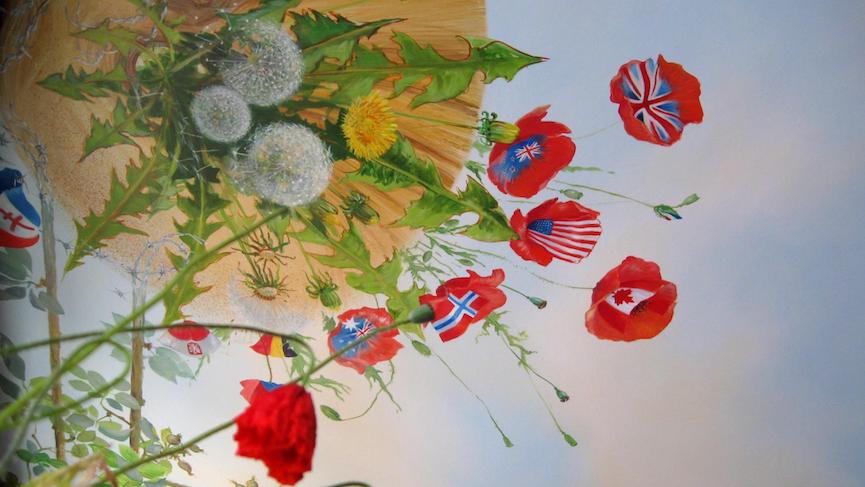Well that was a piece of unfortunate timing: the botch on opening a memorial to Canada’s fallen soldiers in Afghanistan came just before the 75th anniversary of D-Day.
The memorial was, touchingly, assembled by soldiers in Kandahar and kicked around in some kind of storage after “the Canadians” left in 2011 and were replaced by U.S. troops. It finally resurfaced inside DOD headquarters outside Ottawa — a place you can’t just amble into — supposedly to remind employees of what they are there for. Makes you wonder why they need reminding and what else is on their minds. Families weren’t even invited.
In a way, that suits our Afghanistan misadventure. We went in, on the decision of a Liberal government, to mollify the U.S. for not joining their epic mistake in Iraq — still ongoing and which gave the world, among other disasters, Daesh. Our role centred in Kandahar, where most of the 159 who died, were based.
It was marred by charges of handing over prisoners to be tortured by local Afghan forces. When we decamped in 2011 and the U.S. came back in, they didn’t even acknowledge Canadians had been there. You’d have a hard time saying it served any purpose, it certainly didn’t make Canada safer.
Still, heroism in war has never depended on fighting in a just cause. If anything, it’s the opposite. Noble, selfless acts redeem — maybe — reckless, stupid behaviour by those higher up the ladder who risk nothing. This is the deep ambiguity of honouring the war dead. They didn’t deserve to die, and often achieved nothing doing so. They may even have made things worse. Yet they merit our tributes.
This makes the sacrifices of D-Day, in 1944, even more exceptional. The Canadians who waded, literally, into that maw, knew why they were there. They had to since they were all volunteers. We had conscription by then, but it was hemmed in by limits, largely owing to disputes between Quebec and the rest of Canada, over “fighting Britain’s wars.” Conscripts couldn’t be sent to Europe unwillingly. That’s how they acquired the contemptuous nickname, zombies.
So those who went, did so voluntarily and with the folly of the First World War just 20 years before, still strong in their memories. That war was fought on lies (it was the war that birthed modern propaganda) and run by upper class idiots. It included serious military rebellions against the “top brass,” fraternization with “the Hun” between the lines (like Christmas Day soccer matches) that was harshly repressed, and a huge body of antiwar poetry written by soldiers in the trenches.
Right after the war there were uprisings everywhere against the status quo and “ruling class” (like the 1919 Winnipeg general strike). Yet none of that happened in the Second World War. They knew what they were getting into and went. They had concluded the possibility of a Nazi victory was unacceptable.
They risked their lives for the sake of home, country and a way of life and they were right about all that. In Afghanistan, by contrast, the Taliban were/are a nationalistic Islamist group with no expansionist aims. It was about U.S. post-9/11 blood lust and a need to strike someone for what had been done, full stop.
Those Canadians knew there’d be stupid strategies enacted by egocentric leaders and pointless deaths would result. That’s because unnecessary deaths occur in all wars; they aren’t even unnecessary in the sense that, if human beings are involved, there will necessarily be unnecessary deaths. (The first Canadian deaths in Afghanistan came from bombing by U.S. forces during a nighttime training exercise.) They effectively factored all that in, in advance.
It’s perhaps worth an asterisk that they tended not to overstate their achievements — unlike the CTV reporter at the ceremonies this week who said, “D-Day was the start of the liberation of Europe.” They knew that their costly success was due largely to the Soviet Union and its people who bled copiously during the previous three years of colossal battles against German armies. It wasn’t their choice that decades of Cold War and nuclear menace followed immediately, with no breathing or relaxing space at all.
It wasn’t just the last good war, it may have been the only one.
Rick Salutin is a Canadian novelist, playwright and critic. This article originally appeared in the Toronto Star.
Image: Pierre Marcel/Flickr
Make rabble sustainable. Please consider supporting our work with a monthly donation and join us as we take on the 2019 election. Support rabble.ca today for as little as $1 per month!




